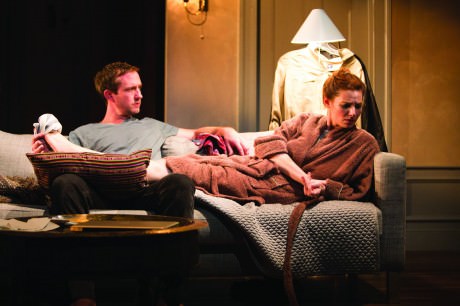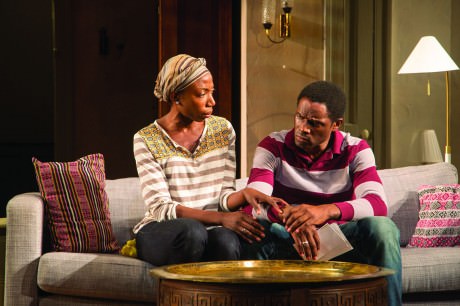I’ve been crazy about Amy Herzog’s writing since I saw 4000 Miles last year at Studio Theatre. When I saw After the Revolution at Theater J last season, I just flipped. Herzog is, as I said then, on my short list of favorite English-speaking playwrights. I’m a full-on fan and follower. That said, I can attest: The Studio Theatre’s riveting production of Belleville gives us Amy Herzog’s writing at its electrifying best.

With Belleville Herzog stretches; she tackles the psychological suspense-and-thriller genre, not an easy one to pull off on stage. In preparation (she has said) she studied film classics of the form from the early 1040s, Gaslight (which was based on a play) and Suspicion (which was based on a novel). I’m not privy to any movie-option deal, but I would be flabbergasted if Herzog’s playscript for Belleville did not someday become a box office bonanza. Now’s your chance to catch and appreciate it in the flesh—in all its raw, naked, and shocking glory. Herzog has not only mastered the form; she has made it her own.
The fun with this form is not knowing much about the story going in or anything about where it’s headed. To share any spoilers would be just plain wrong. This much I can fairly report, however: The tension begins mounting from the get-go—as soon as eerie light spills in sideways through windows casting ominous dark shadows across an apartment where no one seems home. Enter Abby (Gillian Williams). She switches on lights. She’s late 20s, carrying shopping bags, and listening to music through ear buds. From off we hear the sound of moans from a pornographic video. When Abby, curious, takes out her ear buds, she hears too, and she’s alarmed. The sound is coming from the bedroom. She opens the door and looks in. She shrieks. Her husband, Zack (Jacob H Knoll), rushes out nervously, embarrassed, buttoning his fly. He has been jacking off. He thought she’d be at class. She thought he’d be at work. Instantly we are caught up. We follow along as the unnerving disclosures unfold, the pitch heats up, the stakes heighten. And we are utterly seized by horror and pleasure—because the suspense is thrilling us.
Herzog’s technical command of the genre is formidable. Seeming insignificant mentions and objects take on increasing portent, and plot point disclosures are exquisitely sequenced. Of Abby’s shopping trip Zack asks, “Did you use the new credit card?” Kind of an odd question at the time, but…maybe nothing. Little do we know the big something behind it. Or when Zack comes out of the kitchen with a baguette and a butcher knife, which he uses to slice it.
ABBY. Is that really the appropriate implement? For that little baguette?
ZACK. Everything else is in the sink.
And yes, we get it: The playwright has just introduced a huge sharp knife on stage. We probably haven’t seen the end of it. And no, it turns out, we assuredly have not.
Where Herzog really bends the genre, though, is in her keen dissection of a relationship between a particular man and woman, a marriage, a connection driven by conjugal passion as well as friendly familiarity betokened by their nickname for each other: homey. But, as we learn piece by disturbing piece, their relationship is also burdened by mental disequilibrium (hers) and rife with deception (his). In this razor-sharp production directed by Studio Theatre Artistic Director David Muse, and in the eloquent precision of the performances by Knoll and Williams, the revelations proliferate and resonate with all the explosions built in to Herzog’s text. About a fourth-fifths of the way through, Abby fearfully, finally, asks Zack:
ABBY. What’s going on?
ZACK. What do you mean?
ABBY. I don’t know, what do I mean?
(pause)
ZACK. I don’t know.
(long pause)
ABBY. Homey? What’s happening?
In that simple yet haunting moment they become Everymarriage, or Everycouple—two people who thought they knew and loved each other but are realizing that they didn’t and don’t. In Herzog’s transformation of the horror/suspense form, that recognition is—as a psychological and emotional depth charge—far more horrible than any choreographed physical struggle or onstage gore could ever be. Perhaps I’m biased because I’m a theater lover, but I seriously doubt that what Muse, Williams, and Knoll achieve here in live performance will ever translate on film with quite the same propulsive pulse that you’ll experience when you go to Belleville.

But that’s not all. Herzog’s play contains within it another perspective altogether, a marriage between two people who do not unravel before our eyes; in fact by the end they seem strengthened in their connection. They are Alioune (Madeka Steady) and Amina (Joy Jones), French-Senegalese neighbors who live downstairs and are Abby and Zack’s landlords. Steady’s performance is appealing and agile; Jones’s is poised and powerful. Together their Alioune and Amina are solid anchors in a main storyline that ineluctably is going off the rails. With their fascinating subplot, Herzog pushes the suspense/thriller genre into yet another dimension: She layers in a political point of view, an implicit critique of a privileged, self-involved culture beset by first-world problems. Studio Theatre Dramaturg Lauren Halvorsen quotes Herzog on the contrast between these two relationships:
Amina and Alioune have concrete plans for themselves, concrete ideas about what it means to live a meaningful adult life, including work and raising a family. Abby and Zack have different ideas that have to do with fulfillment and self-actualization and happiness and these Western concepts of being exceptional.
The final scene of the play has Amina and Alioune, alone onstage, speaking together in French. I didn’t understand a word, but no matter, because I understood that Herzog was giving them the last word. And just then my mind, which had already been blown, went stunned and blank in awe.
Running Time: One hour and 45 minutes, with no intermission.
Belleville plays through October 12, 2014 at The Studio Theatre’s Metheny Theatre – 1501 14th Street, NW, in Washington, DC. For tickets call (202) 332-3300, or purchase them online.
LINK
Sydney-Chanele Dawkins reviews ‘Bellesville’ on DCMetroTheaterArts.





